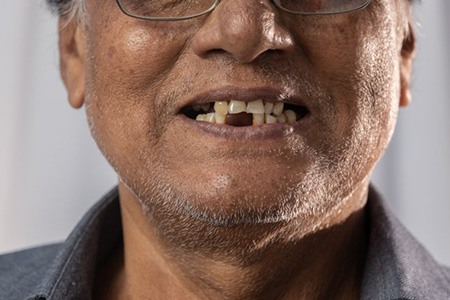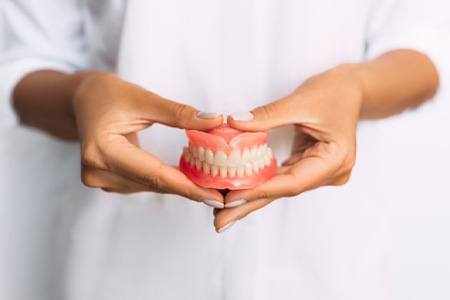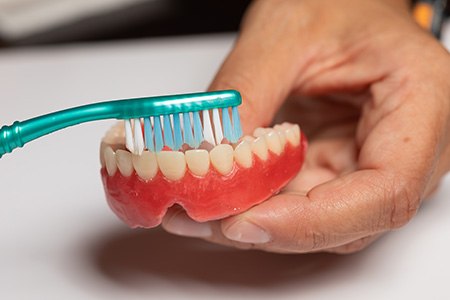Dentures – Royal Palm Beach, FL
Convenient & Cost-Effective Tooth Replacement
Dentures have helped generations of patients in Royal Palm Beach to regain a confident, functional smile. Are you thinking about investing in this convenient and cost-effective form of tooth replacement? If so, we invite you to visit Dr. Civetti and our team for a consultation. We will guide you through your treatment journey and help you to regain a complete set of teeth. Read on below to learn more about dentures and how they may be able to benefit you.
Why Choose Pearl Palm Beach Dental for Dentures?
- No-Mess Digital Impressions
- Natural-Looking Prosthetics
- Professional & Kind Dental Team
Who's a Good Candidate for Dentures?

Almost anyone who has lost a few, many, or all of their teeth can be an excellent candidate for dentures from Pearl Palm Beach Dental. The first step to restoring your smile is to schedule a consultation with Dr. Civetti, during which she will evaluate your oral health to determine if you can be a good candidate for dentures or another restoration. If you’re not ready for this treatment yet, you may be able to become one later after undergoing treatments to address gum disease or restore your bone structure.
Effects of Missing Teeth

Tooth loss is often caused by injuries, tooth decay, and gum disease, and it can have serious consequences for your oral health. The American Academy of Periodontology reports that tooth loss can result in problems like speech difficulties, facial sagging, trouble eating, reduced self-esteem, and the remaining teeth drifting out of alignment, which can make them more vulnerable to trauma and infection.
What Qualifies You for Dentures?

Dentures may be a good choice for you if:
- You are missing all or most of your teeth throughout a dental arch.
- You have sensitive teeth or extensive decay.
- Your gums and jawbones are relatively healthy.
- You are struggling with the inconveniences of missing or badly damaged teeth, such as difficulty eating and embarrassment when you smile.
- You want a cost-effective way to rebuild your grin.
Once you receive dentures, you’ll have to commit to proper oral hygiene and maintenance to keep your appliance in great shape. Depending on your situation, you can replace several or many missing teeth with a partial denture or a whole arch of teeth with a full denture. If you’re looking for a restoration that delivers maximum chewing power and the most stable hold possible, implant dentures may be the best option for you.
Alternative Tooth-Replacement Options

Dentures aren’t the only way to replace lost teeth. If dentures are not right for you, Dr. Civetti can help you explore other tooth replacement options such as:
Dental bridges: A great solution for those missing one or a few teeth in a row, these appliances must be supported by healthy teeth on either side of the gap.
Dental implants: Considered the ideal way to replace lost teeth, dental implants are titanium posts that are surgically placed into the jawbone and fused with its structure through the natural process of osseointegration. These posts can then support a restoration such as a crown, bridge, or denture while providing maximum strength and security. While implants are more costly than traditional dentures, they are permanent.
Types of Dentures

There are a few different types of dentures. During your consultation, Dr. Civetti and our team will examine your mouth and help you decide on the one that best fits your circumstances, treatment goals, and budget. You may decide to get a partial denture, full denture, or implant denture.
Partial Dentures

Partial dentures can replace teeth at multiple locations throughout a dental arch, kind of like a puzzle piece that fits in exactly where it is needed. They are held in place via small acrylic or metal attachments. Often, they are best for individuals whose remaining natural teeth are still relatively healthy.
Full Dentures

A full denture replaces an entire arch of missing teeth. They have a custom-made acrylic base that is usually held in place by natural suction (sometimes, the help of adhesive is needed as well). The teeth of a full denture may be made out of acrylic or porcelain.
Implant Dentures

Implant dentures are held in place via prosthetic tooth roots, called dental implants, which are surgically inserted into the jawbone. The dentures may be fixed permanently in place or be removable. Although implant dentures cost more than their conventional counterparts, they are worth the price because they offer added stability, longevity, and other noteworthy benefits.
How Dentures are Made

After you’ve decided to get dentures, it’s only natural to be curious about how these amazing appliances are made. Constructing a set of dentures involves a detailed multi-step process to ensure that your new teeth are durable, comfortable, functional, and beautiful. Here’s a guide to how partial, full, and implant dentures are manufactured, but feel free to contact our staff if you’d like to learn more.
What are Dentures Made Of?

Dentures consist of two equally important parts: the artificial teeth and the base that holds them in place within the mouth. Here’s an overview of these components:
- Denture base: This serves as the foundational structure that supports the teeth and anchors the appliance. Bases can be made from materials like acrylic, nylon, resin, metal, and porcelain. Full dentures are typically crafted from acrylic that can be made to match the appearance of natural gum tissue, and the bases of partial dentures usually incorporate metal clips so they can connect to the remaining natural teeth.
- Artificial teeth: A denture’s teeth are usually made from materials that can match the appearance of natural enamel such as resin or porcelain. While porcelain is a popular option because it is incredibly lifelike and durable, it is not typically used for partial dentures since it can be abrasive on neighboring natural teeth.
The Denture Creation Process

Each denture is customized to provide the patient with a comfortable fit and a functional bite. Here’s a step-by-step guide to the process of manufacturing one of these appliances:
- Step 1: Civetti uses dental trays and a specialized paste to take impressions of your lower and upper gums, and she may take measurements of your jaw. This creates a precise model of your mouth to ensure that your denture is crafted to the right size and shape.
- Step 2: A cast is made from these impressions and sent to a trusted laboratory where a skilled technician will craft a wax replica of your gumline.
- Step 3: The technician sets teeth made from acrylic resin into the appliance using a machine called an articulator before sculpting the wax to make it match your gums.
- Step 4: This wax denture is sent back to our office so you can try it on. If you and Dr. Civetti approve of it, the appliance will be sent back to the lab to be finalized.
- Step 5: At the lab, the technician places the denture in a flask filled with plaster to retain its shape before boiling it to remove the wax. This creates a negative mold of the final appliance within the plaster.
- Step 6: The technician makes holes in the artificial teeth, adds a liquid separator to the inside of the plaster mold, and injects acrylic into the flask to replace the wax.
- Step 7: The technician carefully removes the plaster and cleans the appliance with an ultrasonic bath to reveal the final denture.
- Step 8: The technician trims any excess acrylic and polishes the appliance to perfection.
- Step 9: The completed denture arrives at our office for fitting. After any final adjustments, you’ll be ready to show your new smile to the world.
Adjusting to Your New Dentures

You may experience mild soreness or difficulty eating and speaking when you first get your dentures, but these issues will fade as you get used to wearing them. Eventually, your dentures will feel very much like natural teeth. You can speed this acclimation process up by eating soft foods, exercising your facial muscles, and practicing speaking in private. If the discomfort persists or seems to get worse, contact our office.
The Benefits of Dentures

If you’re currently in the process of deciding if dentures are the best tooth-replacement option for you, it might be helpful to learn some of the many reasons they are so popular. In this next section, you’ll find some noteworthy benefits of this smile-restoring service. So, read on!
They Are Custom-Made for Each Patient

When patients think of dentures, they often think of bulky, obvious restorations. However, technology and the field of dentistry have advanced dramatically over the last few decades. Now, these restorations are completely tailored to the person’s unique face shape, dental needs, and smile goals. So, you can be confident that they will fit well and look almost identical in appearance to your natural teeth.
They Allow You to Eat a More Varied Diet

Whether you are missing a few teeth in a row or you don’t have any of your natural ones left, you know the negative effect tooth loss can have on your diet. In fact, like many other patients, you may have only one choice: to eat plain yogurt, applesauce, pudding, and other extremely soft foods. The good news is that dentures can restore the strength of your bite, improving your diet in the process!
They Are Cost-Effective

Dentures are quite cost-effective, especially when it comes to replacing a large number of missing teeth. Plus, many dental insurance providers cover a portion of the cost, which makes them even more affordable. If you are interested in getting a price estimate, then take the next step in the process: schedule a consultation with us so we can review your case and determine the cost.
They Are Easy to Clean

Partial, full, and implant dentures are all easy to clean. That makes it easy to keep your gums healthy, your breath minty-fresh, and your restoration in pristine condition! We’ll provide you with specific instructions, like soaking your dentures each night in a special cleaner, so you know exactly what to do (and what not to do) to keep them in tip-top shape for years to come.
They Prevent Common Oral Health Problems

One of the many downsides of tooth loss is that it can negatively impact your oral health. In fact, even one missing tooth can cause your remaining teeth to shift out of alignment, increasing your risk of tooth decay, gum disease, and bite problems in the process. Fortunately, dentures can seamlessly fill the gaps in your smile, preserving the alignment of your teeth and bite.
They Help You Speak Clearly

A small gap between your teeth can create a whistling sound when you talk. So, you can imagine how difficult it is to enunciate clearly with significant gaps in your smile. Don’t worry – we can have a custom denture made to restore your complete, healthy smile. Not only will you notice an improvement in your confidence and bite, but you’ll notice an improvement in your speaking patterns too!
